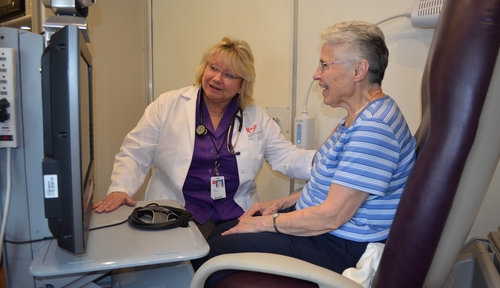More elderly citizens in rural northeast Nebraska are being introduced to virtual health care access through UNMC’s Comprehensive Geriatric Assessment mobile nurse managed clinic.
On certain days of the month, they can drive to O’Neill, Norfolk or Neligh where the 38-foot, custom-built mobile clinic is parked by a regional health clinic. The clinic, a rotation site for 25 students enrolled in the college’s geriatric nurse practitioner program, fills a critical need for comprehensive geriatric assessments for frail older adults in rural areas.
Everyone connects
Claudia Chaperon, Ph.D., associate professor of community-based health in the College of Nursing and project director of the mobile center, uses technology to access UNMC specialists after patients have been seen by one of three geriatric nurse practitioners who travel with her.
Through the Nebraska Statewide Telehealth Network, Dr. Chaperon conferences with the patient’s local physician and family, and specialists in Omaha, Norfolk, Kearney and Lincoln — from the rural site. High-definition video provides clear images of participants and medical exams.
“The idea is improved communication,” Dr. Chaperon said. “Everyone has input and can make adjustments in the care plan to attain better outcomes and a higher quality of life for the patient.”
Grateful patient
For example: a patient with multiple atrophies, similar to Lou Gehrig’s disease, visited the mobile geriatric center citing drug interactions from his many medications.
“We used telehealth to access geripsychiatric nurse practitioner counseling for this man and had multiple conversations with his urologist and cardiologist in Norfolk. Then we all talked to our Pharm.D. specialist in Omaha,” Dr. Chaperon said. “In the end, we developed an intraprofessional collaborative treatment plan that decreased his meds by one-third.”
UNMC, a hub site for the telehealth network, offers videoconferencing to more than 100 not-for-profit hospitals, public health departments and mental health clinics across the state and other health care facilities worldwide. Providers consult with each other and access other specialized services such as tele-emergency and telepharmacy.
Access to the secure network has been expanded to computers and mobile devices, which enables providers to consult from virtually anywhere Internet is provided.
